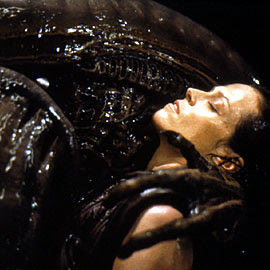
As our former president suggested, let's go to Mars! This NYT article suggests that a new surge in sci-fi inspired fashion offers optimism for the future during bleak economic times. Not only do we want to dress up like superheroes, we also seek visions of the future through our past imaginings --
Watchmen,
Star Trek, Buck Rogers -- are all coming to our movie screens within the year. A telling quote:
“We’re frantic to lose ourselves in fantasy,” said Martin Kaplan, an associate dean of the Annenberg School for Communication at the
University of Southern California. “We love heroes, not technocrats. When times are so grim that you can’t get out of bed, you dream of someone who can fly.”
Click
here to read article.
We also desire to make these visions a reality -- check out this article on
Charles Simonyi, a "space tourist" on the International Space Station (only $35 million for the 13-day mission!). Virgin Galaxtic has plans to offer space flights for a more accessible $200,000.
Also click here for NYT article.






